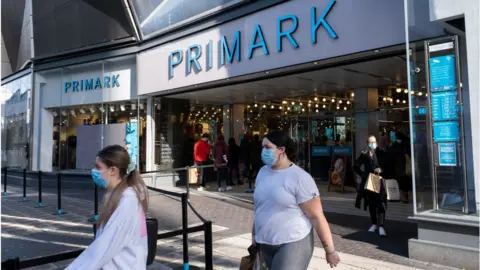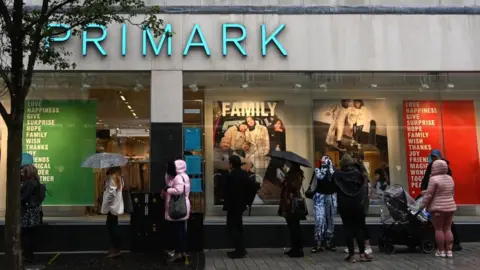Primark refuses to go online despite £1bn lockdown loss
 Getty Images
Getty ImagesPrimark says it has no plans to sell its clothes online despite warning that lockdown store closures could cost it more than £1bn in lost sales.
Some 305 of Primark's 389 global stores are shut - including all 190 UK outlets - but unlike rivals it has no online arm to fall back on.
Customers have said they would welcome the retailer setting up an online shop.
But Primark, which saw a 30% sales fall to £2bn in the 16 weeks to 2 January, says the cost would mean price rises.
It contrasts with online only fashion retailers such as Asos and Boohoo, whose sales rose by around 40% in the last four months of 2020.
On Thursday, consumers called on Primark to embrace e-commerce with one tweeting: "Online sales are thru the roof during the pandemic. You're missing out on a LOT of money."
But the retailer tweeted back: "We prefer to sell our products in our physical stores but thanks for the suggestion."
Allow X content?
Since March last year, non-essential shops in the UK and overseas have faced strict curbs and prolonged closures and all are currently shut in England.
In a statement, Primark said that if all of its stores stayed closed until 27 February 2021, it expected to miss out on £1.05bn of sales - up from a previous estimate of £650m.
The retailer said it would partially mitigate this by cutting its costs, but did not say if that would mean job losses. It added that it only expected to break even in the first half of the financial year, after seeing healthy operating profits of £441m last time around.

Why won't Primark sell online?
In the past Primark has said it won't sell online because the cost of manning the operation and processing high volumes of returns would mean it could no longer offer low prices.
"As a fast fashion retailer they are on a low margins anyway - they have to be very competitive on price," Patrick O'Brien, UK retail research director at GlobalData told the BBC.
He said pure online players like Asos and Boohoo could make it work because they were "geared up for it in terms of logistics".
 AFP via Getty Images
AFP via Getty Images"But Primark would be starting from scratch, and would have to integrate any new online operation with its existing store structure which would be costly."
Can the retailer survive offline?
Despite this Mr O'Brien said the retailer was still likely succeed, pointing to the surge in sales it saw when its shops reopened after the first lockdown.
But Retail Economics' Richard Lim said Primark was at risk of "potentially alienating its customers" who increasingly expect to be able to shop online.
"They have very loyal customers who love the brand, but they are crying out to be able to access it online.
"The longer they are not online, the more disruptive it is. The more their customers are discovering new brands and ways to shop."
Associated British Foods also owns food and agriculture businesses. Sales across the group were down 13% in the 16 weeks to 2 January at £4.8bn.


The changing online dial
There are always winners and losers in retail but this Christmas the picture is more polarised than ever thanks to the effects of the pandemic. Just contrast the fortunes of Primark, which doesn't sell online, with Boohoo and Asos which have both reported soaring growth in sales.
All our big supermarkets have now reported bumper Christmas trading, too, which is no real surprise given we can't go out to eat and so many of us are working from home. This growth has also been driven by an extraordinary rise in internet orders.
While Primark is bracing itself to lose £1bn in business as a result of store closures, Tesco says it added £1bn of extra sales online this festive quarter. It's been very tough for many traditional non-food retailers, big and small, who've been unable to make up for all the lost sales from their High Street shops. Looking ahead, the big question is where the online dial will settle when our lives eventually return to normal.

